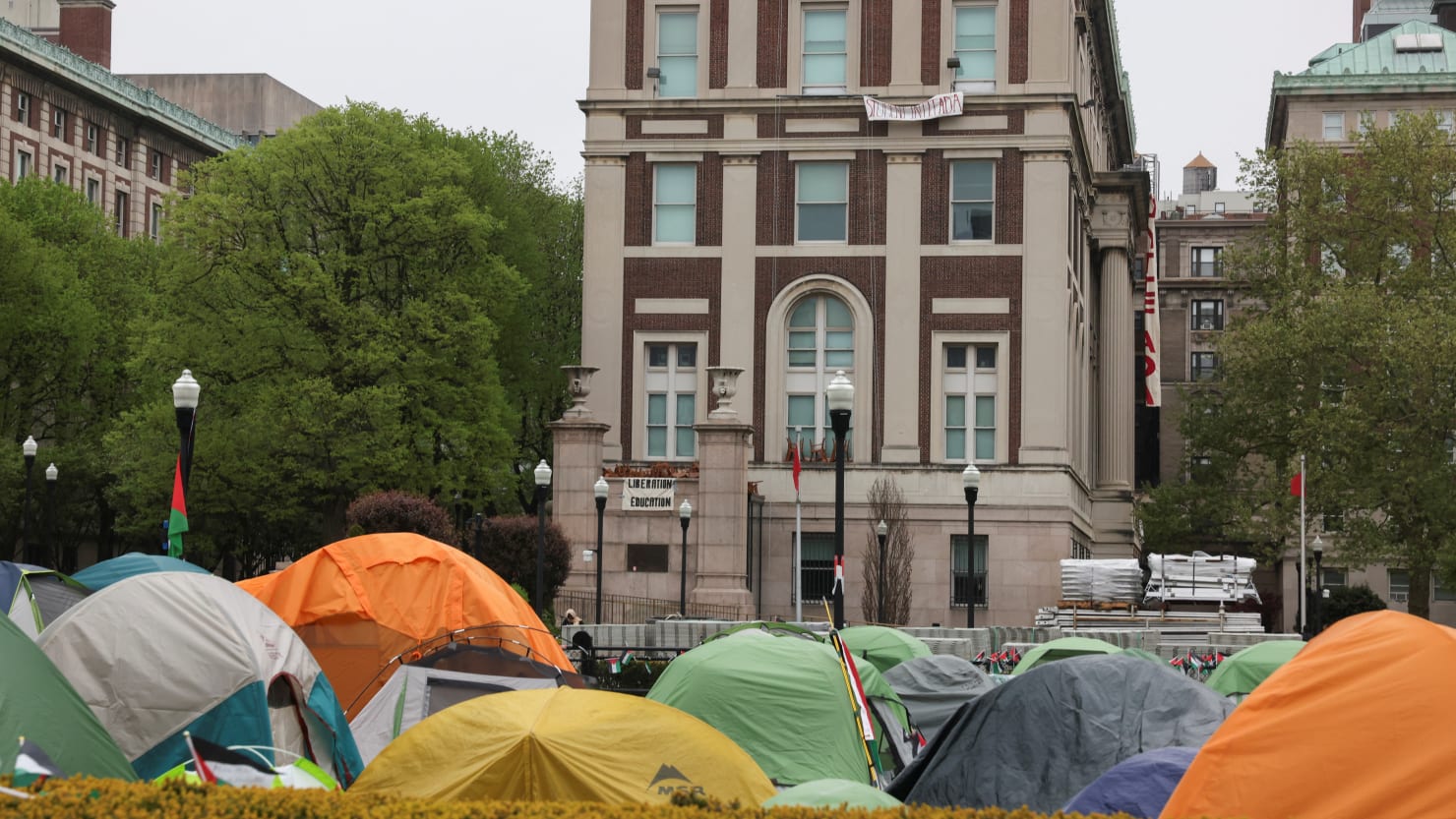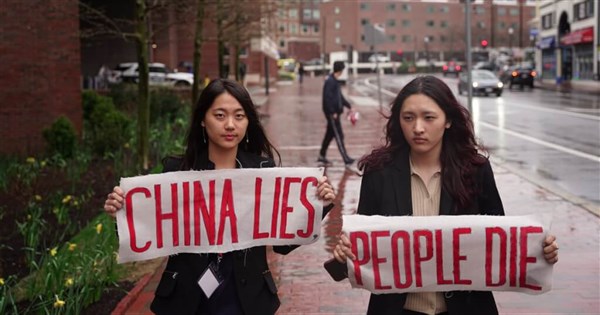








UBC-affiliated groups, including the Centre for Climate Justice (CCJ), the Asian Canadian and Asian Migration Studies (ACAM) program, and the Gender, Race, Sexuality and Social Justice (GRSJ) program, have released statements in support of the Palestinian solidarity encampment on MacInnes Field. The encampment organizers, People’s University UBC, listed their demands for UBC, which include divesting from companies complicit in Palestinian human rights abuses, boycotting Israeli universities and institutions, and publicly condemning what organizers and human rights experts call a genocide in Gaza. The CCJ supports the encampment's right to expression and assembly, citing previous student-led climate protests and civil disobedience at UBC. ACAM called on UBC faculty to join the encampment and protect student rights to protest and peaceful assembly. UBC President Bacon stated that UBC's endowment fund does not directly own any stocks in the companies identified by the movement, accounting for about 0.28% of the endowment fund. The UBC Vancouver Senate failed to pass a motion to cut or suspend academic ties with Israeli universities. Both the CCJ and ACAM oppose discrimination or harassment toward the encampment and believe that police involvement is unnecessary and could target marginalized communities. The statements from CCJ, ACAM, and GRSJ do not represent the official views of UBC or all affiliated faculty members. [4966a2c3]
Pro-Palestine student protesters have reestablished an encampment on Columbia University's South Lawn during Alumni Weekend. The NYPD had previously cleared the protest encampment in May, leading to arrests and sparking police intervention at university protests nationwide. The students had initially set up tents in April to protest the school's financial interests in the Hamas War. After 112 people were arrested and the tents were removed, the school canceled its university-wide commencement. The protesting students have now set up new tents and declared the South Lawn a 'Liberated Zone' for the third time. They accuse Columbia University of colluding with a billionaire lobby to collaborate with foreign governments and involve the NYPD in brutalizing and arresting students on campus. [ac637e13]
Chinese students from at least 174 colleges and universities across six continents have erected encampments in solidarity with Palestine. They have found unique opportunities to express solidarity with Palestine while braving the political risks of public activism abroad. Participating in campus protests can have a more profound impact on a student's life than merely attending classes. Chinese students have been posting about the protests on Chinese social media and have found the opportunity to see another youth protest movement in person. Chinese students face greater risks when participating in the movement, including increased scrutiny at immigration checkpoints and potential visa revocation. Despite the risks, Chinese students have chosen to participate in the encampment movement. Their engagement has provided opportunities to forge transnational solidarity and draw connections between different rights movements. Chinese students' support for the movement has been seen at various universities through signs, slogans, and artwork. Some Chinese student groups have drawn connections between repression at the encampments and repression in China. Reactions to the encampments on Chinese social media have been sympathetic towards the students. [2e932dbd]
The protest at Harvard University highlighted ongoing tensions and concerns surrounding China's actions in various regions. The protesters accused Xie Feng of human rights violations and aggression in Tibet, Hong Kong, East Turkestan, and Taiwan. They called for an end to the occupation of Tibet and criticized Xie for his role in turning Hong Kong into a dystopian state and intimidating Taiwan. The protest delayed Xie's speech for 45 minutes, as the protesters held up banners and confronted him. The disruption of the event at Harvard Kennedy School reflects the growing discontent and opposition to China's policies and actions. [62ddf49d]
In a recent article published by ChinaFile, James A. Millward draws parallels between the student movements in China's Tiananmen Square in 1989 and the current antiwar movement in the United States. Millward highlights the concerns voiced by Chinese students in 1989, including corruption, inflation, lack of free press, and participatory governance. Similarly, American students today are mounting an antiwar movement, calling for divestment from Israel and an end to U.S. support for Israel's offensive war machine. Despite the differences between the two movements, Millward emphasizes the excessive rhetoric and reactions that both movements have faced.
Millward advises university presidents to learn from the mistakes made by Deng Xiaoping, who used lethal force to clear Tiananmen Square. Instead, he suggests that university presidents form a committee that includes elected representatives of activist student groups, alumni, faculty, staff, administration, and trustees. This committee should consider ways to reduce the university's contribution to violence, with divestment from war stocks being a powerful message to encourage similar processes in other institutions. The article serves as a reflection on the lessons from Tiananmen for today's university presidents, urging them to engage with student movements and address their concerns in a peaceful and constructive manner. [a0853345]
Students at RMIT University in Australia have started an encampment as part of the global Students for Palestine campaign, demanding that universities divest from funding and profiting from genocide through links and partnerships with defense firms and contractors. The protests aim to raise attention and engage in discussions about the Israeli-Palestinian conflict. While the protests are seen as a positive way to bring about change, it is important to ensure that all students and staff feel physically safe and that respectful debate is maintained. The protests have been peaceful so far, but it is crucial to avoid violence and antisemitic rhetoric. Student protests have a history of success in bringing about change, and universities should consider the demands of the students and engage in dialogue. The RMIT students have gone a step further by demanding the closure of the Sir Lawrence Wackett Centre, which has partnerships with defense firms such as Thales, BAE, Raytheon, the US Department of Defense, and Lockheed Martin. The article emphasizes the importance of discussing and understanding the Israeli-Palestinian conflict on university campuses and encourages students to find a solution that is both compassionate and practical. The author, Alexandra Wake, is an associate professor of journalism at RMIT. [c578a766]
The Cambridge City Council has passed a resolution supporting pro-Palestine protesters at Harvard University and the Massachusetts Institute of Technology (MIT). The resolution, supported by seven out of nine council members, urges Harvard, MIT, and the Cambridge Police Department to respect the right of pro-Palestine students to protest. It asks the City Manager and the administrators of Harvard and MIT to respect the right of students to advocate for an immediate ceasefire in Gaza and protest the believed complicity of their academic institutions and government with the atrocities being endured by the people of Gaza. The resolution also calls for the universities' leaders to abide by guidelines expressed in an ACLU statement. The resolution aims to prevent protests from escalating and calls for protests to be met with dignity and respect, not criminalization. The Cambridge City Council previously adopted a resolution urging a ceasefire in Gaza in late January, making this the second major vote this year relating to the Israel-Hamas war. The resolution reflects the growing support for pro-Palestine protesters and their right to express their views peacefully. [f4a11e2b]
China is using its state media to criticize U.S. campus protests in order to win support from the Global South. The Chinese government is framing the protests as evidence of the U.S.'s hypocrisy and double standards. This strategy is aimed at appealing to developing countries and positioning China as a champion of their interests. The Chinese Communist Party's propaganda machine is highlighting the protests as a way to undermine the U.S.'s global reputation and influence. The article suggests that China's efforts to exploit the campus protests could have significant implications for the U.S.'s soft power and influence in the Global South. [11b96496]
Protests over Israel's conduct of the war in Gaza have led to crackdowns on campuses around the world. Administrators have called in local police to break up pro-Palestinian protesters demanding divestment from Israel. The crackdowns are reviving memories of student-led protests during the American civil rights movement, the Vietnam War, and the pro-democracy demonstrations in Beijing’s Tiananmen Square. The wave of pro-Palestinian protests on U.S. campuses took inspiration from demonstrations at Columbia University. Pro-Palestinian encampments have also appeared in the U.K. and Europe. There may be a reckoning of how administrators handle protests over the Israel-Hamas conflict. [1964d48e]
The article discusses the trend of encampments at universities in South Africa, inspired by Columbia University. The encampments involve students setting up tents on campus grounds as a form of protest. The article provides advice for the encampers, including keeping tents dry, providing adequate food, and planning educational activities. It also mentions the challenges faced by encampers, such as cold weather and the need for hygiene. The article concludes by suggesting that constructive conversation and critical thinking can be alternatives to camping. [ac60153f]